#everyone should know about this and everyone should also know about public domain review. so much fun
Explore tagged Tumblr posts
Text


Kittens and Cats: A First Reader (1911)
#everyone should know about this and everyone should also know about public domain review. so much fun#very cheesed about my new profile pic courtesy of this#ari rambles#cats#public domain review
19 notes
·
View notes
Text
I am Tim, I operate BDSM101.ICU. I am a Dom, and have been so for over a decade and a half. I won't even try to pretend that I know everything, but I know enough that educating people newly on their BDSM journey is well within my capabilities. Educating would make me an educator, and as such, I have adapted and adopted a Kink educator code of conduct listed below.
INTRODUCTION
The Kink Education Code of Conduct (KECC) establishes a code of conduct for kink educators and producers. It provides practical guidance for navigating many of the ethical dilemmas we face and creates a framework for clear communication between educators and producers.
The KECC is a roadmap for reasonable human beings, not a precise legal code. You should interpret it using good judgment and good faith, seeking always to adhere to the spirit of the code.
This is the educator version of the KECC. This code has been altered to reflect my personal work, such as removing student portions as I do not currently work with classes and students.
MODELING CONSENT
I consistently practice excellent consent in private and in public. Excellent consent is:
Verbal or written when I am teaching or playing in public. Verbal, written, or covered by a pre-existing relationship or negotiation when in private.
Fully informed, where all parties understand what is agreed to.
Expressed with explicit or enthusiastic agreement.
Consistent and continuous.
Not coerced, not forced, and free of manipulation.
PROFESSIONAL COMPETENCE
I teach within my area of expertise:
I only teach material I thoroughly understand and am capable of teaching correctly.
If I teach techniques that are contrary to commonly accepted best practices, I clearly communicate that and explain my reasons for doing so.
When teaching any topic in the domain of a particular profession—for example physical fitness, stretching and warmup, anatomy, nerves, blood play, breath play, hypnosis, trauma response, mental health, legal issues, or any kind of medical play—I explicitly explain whether:
I have relevant professional qualifications, or
I have reviewed the material I am teaching with a qualified professional, or
I am teaching my own opinion.
I respect each person’s right to choose their own risk profile:
I do not pressure anyone to perform techniques outside their risk profile.
I make it clear that students are welcome to audit any techniques they are not comfortable performing.
If I teach high-risk techniques or activities, I clearly communicate the risks involved and I encourage my students to negotiate in class before engaging in any hands-on practice.
I respect each venue’s policies about high-risk activities.
INCLUSION
I treat everyone in a respectful manner and make them feel welcome:
In both my personal and professional lives, I do not discriminate against someone because of that person's race, color, religion, sex (including gender identity, sexual orientation, sexuality, and pregnancy status), national origin, age, disability, or genetic information. I also do not retaliate against anyone because they have submitted a complaint about discrimination.
I do not intentionally do anything that creates a hostile environment for any group of people.
I apologize when something I do creates a hostile environment for any group of people.
I use correct pronouns for each person. I ask people what pronouns they use when I am not sure.
Except when teaching gender-specific topics, I present material in a gender-neutral fashion rather than assuming specific gender roles.
Whenever possible, I teach techniques that are applicable to all genders, body types, and physical abilities.
ACCOUNTABILITY
I hold myself accountable for my actions and enable the community to help hold me accountable:
I acknowledge that I am flawed and will not always succeed at applying this code of conduct to my behaviors and actions.
I respectfully and proactively seek feedback from the people I play with, the people I teach, my peers, community leaders, and others.
I acknowledge my inevitable mistakes and am receptive to others telling me when I have fallen short.
When I make a mistake I do my best to apologize, make things right, learn from the experience, and make changes to ensure the same mistakes don’t happen again.
I engage openly and honestly when addressing any reported consent issues, including participating in an accountability process with anyone who reports that I violated their consent or injured them.
I follow this code of conduct and the accountability processes of producers and organizations I work with.
I post this Code of Conduct wherever I have an online presence and explicitly state that I have voluntarily committed to following it.
I have at least one accountability contact and make their contact information available wherever I have an online presence, as well as in my class handouts. *
I do not use any kind of non-disclosure agreement or threat of legal action to prevent my partners from discussing their experiences with me.
PROFESSIONAL CONDUCT
I am a professional:
I represent myself honestly, giving complete answers to all questions during the booking process.
I provide complete and accurate information about my experience and qualifications.
I am clear and up-front about my expectations regarding logistics and compensation.
I show up on time and prepared.
I understand my conduct reflects on the venues that hire me and behave in a professional and responsible fashion while working.
DISCLOSURE AND PRIVACY
I proactively provide producers with complete and accurate information about:
Any consent incidents I have caused or been accused of
Any injuries I have caused or been accused of
Any accountability processes I have been the focus of When disclosing information to producers or in public, I am careful to protect the privacy of anyone I may have harmed.
I respect other people’s right to freely discuss their experiences with me:
I never pressure anyone to keep quiet about their experience with me, nor do I ask my partners to refrain from discussing their experiences with me or others.
I do not retaliate against anyone for sharing their concerns about me with others, either directly or via third parties.
I respect everyone’s right to hold private discussions about educators and venues:
I do not ask anyone to share private information with me, nor will I look at information that should not have been shared with me.
I do not harass, challenge, or question anyone who shares information about me in a private forum.
* I am working on fulfilling this one, and will be actively shared once I do have someone I feel is capable of fulfilling the accountability point of contact for me.
7 notes
·
View notes
Text
I am enjoying TOTK immensely. I wanted to experience BOTW again with new things to do, and it’s providing that. I’m desperate to play it again right now.
...Hot takes of a BOTW stan below (hidden for some TOTK gameplay spoilers.)
The borderline BOTW slander that undercuts all of the breathless TOTK praise is ludicrous. People coming out of the woodworks to say “This works in a way BOTW never did.” I didn’t realize I’d be having a contrarian take on these games; I thought BOTW was basically the only thing in the world I was in complete agreement with the public and critics on. BOTW made me love gaming again, I have a completely cringe emotional attachment to it and I understand the argument for the irrationality of that, but-- not everyone had the same problems with it that online reviewers insist we did. Not everyone has such a negative image of the “emptiness” of Hyrule or limitations like climbing in the rain that forced you to overcome a challenge or find another way around. To me, the world felt like it had been through something devastating, and just enough time had passed for people to put their lives back together and adjust to the state of things. The danger the Divine Beasts posed to the domains felt significant, with Rito Village being the only domain with a stronger plotline and stronger threat in TOTK, IMO. (I love Vah Medoh, but it and its threat was the weak point.) I saw complaints on the variations of Blight Ganon being too similar, despite different attacks and designs, but nothing on the cutscenes following these Temple Scourge bosses being identical and how much that takes away from feeling anything about the original Sages? I also feel the shrines in this game (with the Zonai combat exceptions) are significantly weaker with more obvious solutions, and the Koroks are less fun to search for when the pairs are littered around the world. I’m happy for you if fusing vehicles to get them where they’re going is your favorite thing, but believe it or not, some of us just... prefer climbing and running and riding horses, so those Koroks become a bit of a pain.
I do think TOTK improves on certain things. I do appreciate that it expands on certain things. I even appreciate that it changes certain things, regardless of if I agree the change is an improvement-- they threaded a very difficult needle in creating a new game with the same core characters on the same map, yet knowing where the world should differ and where it should be recognizable. It broke my heart to lose my well-used runes and replace them with what felt a bit like 3 of the same rune just slightly tweaked; losing Stasis and the bombs fundamentally changes the way I did combat or collected ore, while other fans claim these (and all the original runes) were useless. BOTW invited you to play how you wanted to, and I admire that TOTK has the same mission statement, but it does feel to me that “how you want to” necessitates Ultrahand contraptions more often than it doesn’t. Arguably it is the selling point of this game. Is it fun sometimes? Sure. Does it force you to be creative? Absolutely. Do I enjoy it as much as the internet seems to? I don’t really think that I do; I think I get more use out of Ascend and the froggy suit than building vehicles to get me up and around. And that still isn’t a criticism of TOTK, not genuinely, because I never think it’s worse to have more options and features; what I do thoroughly and fundamentally disagree with is the notion that the originality and experience of BOTW counts for nothing, or even just counts for less, when you can always come back years later and stack more on top of it. By that logic, no game will ever be as good as the hypothetical sequel they could make.
I like the depths and the sky islands. I’m terrified by the new enemies. I thought the cutscene memories were effective, and Ganondorf properly imposing. The dragons are arguably my favorite thing in BOTW, so the Light Dragon plotline this time seems tailor-made for breaking my heart. I think TOTK is a success. I don’t think it’s possible for anything to replace BOTW, I fully accept that’s an impossible ask and one that I wasn’t demanding or necessitating. Some say that sticking by your first favorite is a boring and unimaginative take fueled by nostalgia, but I’d counter that social media also has a massive impact on how highly we prioritize the meme-ability and posting potential (see New Horizons) of just about any media nowadays, and Ultrahand or the Koroks provide that.
Okay I love you Link I love you Zelda I miss you Kass I love you Sonia I’m gonna go play now bye bye bye
2 notes
·
View notes
Text
Clearing up the confusion: Do you need to register your work to claim copyright?
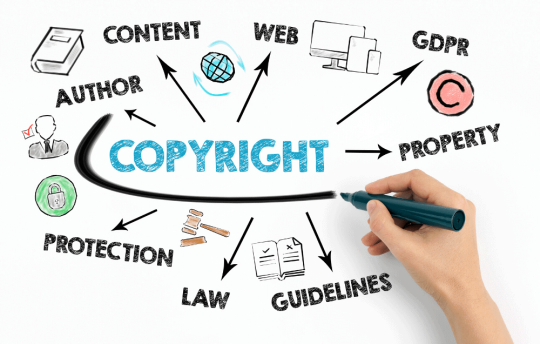
A copyright is a type of intellectual property that gives its owner the only authority over reproductions of their original works of art. It is additionally described as the owner's rights to the original creative works that they have produced. In India, copyright is represented under the Copyright Act of 1957. It grants the owner the right to create, distribute, and exhibit the work in public.
The Act states that a creator is allowed to produce a book, a song, or an artwork. The owner is allowed to do this per the Act. However, you must choose copyright registration if you have requested compensation for having your work forged. How to register a work to claim will be covered in great depth.
What Steps Should I Take to Register My Copyright?
You can register your creative work's copyright in a variety of methods. But first, before we get started. Let's examine the advantages of possessing copyright:
The creator receives public ownership of their original works.
Without giving up their rights, the owner can release their work into the public domain with the aid of copyright. The originality of works that belong to their legitimate owners cannot be contested. Nobody can deny knowing about the owner and his efforts. When the work is done in public, everyone will be aware that no one else can perform it.
Possibility of Ownership
When a creative work is registered within five years of publication, the owner can be assumed to be the author. A presumption of ownership is essential to preventing serious misuse or violation of the work. Furthermore, only the owner may assert ownership if copyright registration is done within five years.
It Facilitates the Work of the Owner to Stand Out in the Crowd
The proprietor might separate from the competition by copywriting the job. Additionally, the owner makes more money. As a result, the owner's work distinguishes itself from that of the rivals and prevents them from abusing their position.
In order to stop copyright infringement, owners might file a lawsuit.
Section 48 of the Copyright Act allows the owner to sue if they discover that their work has been utilized unlawfully. The owner might further assert his ownership of the work by choosing copyright registration. If the owners possess the copyright, they may bring a claim for copyright infringement and sue the defendants.
So, the advantages of having a copyright for your work are as follows. As for how to register your work for copyright, follow these steps:
submit a Form 16 application.
The owner must submit Form 16 under the 1957 Copyright Act. They have two options for filing the e-application: in person at the copyright office or online at the official website, http://www.copyright.gov.in. An application fee must be paid.
Ensure the advocate countersigns the application after attesting it.
To make sure they are genuine and lawful, sign the application and have your advocate countersign it. Additionally, this will guarantee that your application is given top priority. The lawyer's countersignature grants the copyright application legal standing in the eyes of the law.
The owner will be given a diary number, and they must wait until the examination is over.
Third, the application is reviewed by the judiciary, and the owner is given a diary number for the application. They also have to wait for the process to be finished and approved. 30 days must pass before the owner receives approval.
The registration process is finished if there is no objection.
If there are no objections and the creative work is approved, the registration process is finished. Additionally, they receive a certificate of copyright registration. The registration is complete after the examiners determine that the creative work's substance is not inappropriate.
Conclusion
Therefore, it is simple to comprehend and take note of the copyright registration process. Furthermore, understanding how these things operate can be very advantageous to you. More importantly, you can fully comprehend how copyright registration functions by being aware of how it operates.
Read Our Other Blog To Know More About how to Copyright - Navigating Copyright Objections: A Guide to Crafting Effective Responses
#copyright#copyrightregistration#copyrightclaim#copyrightfiling#copyrightprotection#copyrightlaw#copyrightlawyer#copyrightattorney
0 notes
Text
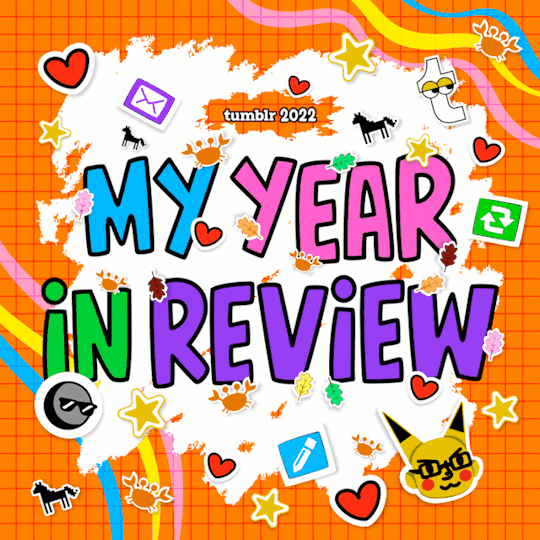
I posted 6,205 times in 2022
That's 818 more posts than 2021!
77 posts created (1%)
6,128 posts reblogged (99%)
Blogs I reblogged the most:
@trackerwrites
@tenno-skoom
@totalspiffage
@gallusrostromegalus
@criticalrolo
I tagged 1,266 of my posts in 2022
#dracula daily - 235 posts
#spy x family - 49 posts
#ace attorney - 45 posts
#dracula - 42 posts
#goncharov - 40 posts
#pokemon - 30 posts
#unreality - 28 posts
#warframe - 27 posts
#live a live - 24 posts
#encanto - 18 posts
Longest Tag: 139 characters
#i'm terrified to know what cold takes are in the notes but my personal take is if i cannot vibe with the summary i cannot vibe with the fic
My Top Posts in 2022:
#5
Mina is relatable, because I too, worry about Jonathan when I haven't heard from him in some time.
176 notes - Posted July 26, 2022
#4
As we hit a point where people undoubtedly want fix-it fics and such, I wanna remind everyone Dracula is public domain so if you like your idea enough you can publish it as an actual book not just fanfic.
216 notes - Posted September 19, 2022
#3
The worst part about Dracula Daily has been knowing Quincey dies, and now that we’re reading slower, actually catching a lot of the fucking foreshadowing that he’ll be the one to not make it.
Quincey is the one to vow to kill Dracula even should he be struck down doing it.
Quincey is the one to express his remorse towards Renfield’s death, when he will also be killed attempting to protect Mina from Dracula.
There’s a few other moments but like, there were points where I was ready to throw down with Stoker over how much the foreshadowing hurt.
880 notes - Posted November 6, 2022
#2
Give Mina a gun this, give Johnathan a gun that, but when I, Quincey Morris, try to shoot Dracula
3,567 notes - Posted September 30, 2022
My #1 post of 2022
I hope everyone realizes now that Dracula literally cannot steer the ship. The captain tied himself to the helm and a crucifix (he alluded to this earlier in one of his logs) and thus Dracula can't touch it.
Additionally Dracula's powers weaken during the day (iirc he can be in sunlight but his powers don't work) so he has to steer the ship via weather at night.
The man has been buffeting the ship with wind to get to England.
14,450 notes - Posted August 8, 2022
Get your Tumblr 2022 Year in Review →
#tumblr2022#year in review#my 2022 tumblr year in review#your tumblr year in review#Wincing at my lag of tagging oof
0 notes
Text
I may have miscommunicated part of my clever plan. When I said average lifetime, I did in fact mean from date of publication/creation/negotiatable. If you publish your novel at age 20, then it's still going to be covered by copyright until your 98 years old (average us life expectancy 77.23 years). I just think in principle a kid born that day should have at least a 50% of seeing it enter the public domain before he dies.
That said, I feel like your attempting to use copyright to immunize the artists family from what literally everyone else faces, and if we're going to do that (and I'm all for it) I would prefer to immunize everyone's family from that. Retail workers don't get any physical items left other than what they buy with their paycheck, it seems strange that an artist that you're assuming has been unable to monetize his art in a human lifetime is inherently more important to you than someone who helped fix your food at a diner or talked you through fixing your computer over the phone.
Know I think you have a valid counterargument to bring to the table - Those customer service people got paid up front whereas art is a lottery. I have a book on Amazon, and I'm pretty sure in the years since I've published it I've made $50. I also got one positive review in that time. Help desk work is still going to let me work until I die destitute and alone, but I do get a paycheck every 14 days so I'll die destitute, alone, and I won't have died of of either starvation or exposure.
And because of the nature of throwing out an artistic endeavor that will sink or swim, I am absolutely agree on a long copyright term to give it every chance to swim.
But an average human lifetime is long enough. No one is going to care about my writing after I die, the additional time is not going to change that. If you are a Neil Gaiman or Diane Duane, then guaranteed income from your art for one average human lifetime rather than 2-3 before it goes into the public domain seems to me to also be enough.
So one thing about the AI art controversy I don't see get talked about on one side of the conversation as much is that there is a nonzero percentage of the AI folks that feel that we should abolish copyright altogether
And no, this is a terrible idea
Many of them clearly seem to think that this would destroy big companies like Disney
It would not remotely hurt Disney's bottom line
They'd be a bit pissy about loss of control over their properties, yes
Then they'd turn around and steal blatantly from indie creators of all walks without any monetary compensation
We know they would do this because they tried to claim that they bought the rights to Star Wars and not the responsibilities of Star Wars (paying royalties to the writers who've worked on it for decades, some of whom are genuinely in need of that money)
Copyright is certainly too easy for big companies to exploit but it's also the only protection indie creators HAVE
Of course these are among the same people who think you're "elite" for being pathologically incapable of putting a pencil down.
Because it's so "easy" to make a living as an artist or something (what the actual fuck world are you living in if you think this)
196 notes
·
View notes
Note
Might I please ask if you have an opinion of DRACULA? (Either the novel itself or the adaptations); having read both this novel and FRANKENSTEIN, I'm tempted to agree with the reviewer who wrote that one of these is a Classic and the other is actually Fun to read ... (-;
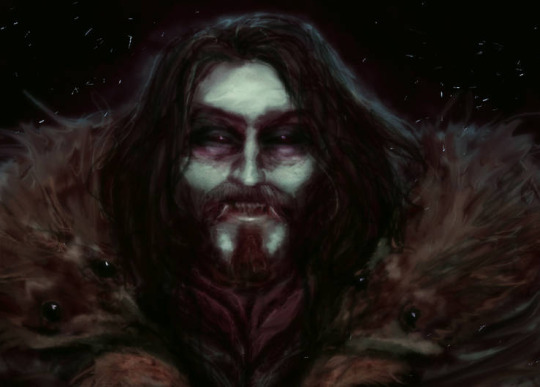
(Art by Cinemamind)
I completely understand the sentiment of "one's a classic and the other's fun to read" and I don't necessarily disagree with it. I don't read Frankenstein for fun, I read it because it's the book closest to me and it's heartbreaking to think about and it's got one of my favorite characters ever in it and it's got a stake in my soul I gotta renew every year. Dracula, however? Dracula is a blast and it boggles the mind as to how every adaptation can be so crushingly lesser in nearly every aspect. My hardcover edition with annotations is one of my most prized possessions.
It's interesting that people tend to talk about Frankenstein and Dracula like Frankenstein was cutting edge sci-fi while Dracula was archaic and folkloric, when it's really the other way around. Frankenstein is the story of an arrogant dipshit rejecting modern science and thinking to unearth outdated knowledge soon blossoming into a vicious cycle of savagery, where as Dracula is the story of an ancient predator adapting and trying to take over current society and fought by a ragtag team of upstanding citizens using modern tactics to stave him off and eventually fight him, desperately struggling to stay ahead of the curve as he wisens to their tactics.
This book was really ahead of it's time in so many ways. I could easily see excerpts of it, particularly the Demeter journals and Renfield's story, taking off as internet creepypastas or found footage horror films. Dracula's a story about a group of characters playing detective as they update their blog entries about the coming of an initially incomprehensible horror taking over their lives. It's a story that could work regardless of Victorian or vampire trappings, and we know this because Blair Witch Project and Marble Hornets are some of the biggest horror successes of the past decades, all of which follow the same general idea, except in Dracula, they don't just discover the true nature of the horror, they also start fighting back and ultimately destroy it.
Dracula's obviously a great villain, that goes without saying. I don't actually tend to take Dracula seriously much of the time because I'm very fond of comedy takes on Dracula and vampires, but that doesn't at all diminish his impact in the original book. He's barely in the novel for much of it which makes his every appearence Count, and the atmosphere as well as the many, many forms he can show up or be suggested at really help solidify what an incredible presence he can be.
He's the strange ruler in a foreign country, he's the kooky old man with weird customs, he's the creepy house owner tormenting a hapless guest, he's a barbarian who lives in nostalgia. He's the wind on your window, a dog on the street, a bat in your windshield, a storm on your ship. He's a predator in every way possible, he's a handsome aristocrat, he's a tragic victim of his own monstrous nature, he's a demon who threatens to consume all mankind, he's the fucker who assaulted your loved one and has to go down hard by machete right now.
Even if we just threw out the 124 years of Dracula's history out, we'd still have enough material in the book not just for a great villain, but dozens of great villains and characters who could take just about any of these traits and run with them. And still, the thing that really, really stuck out to me about Dracula wasn't him, it was the other characters
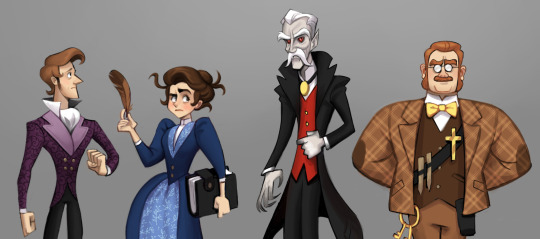
Art by Kiwi
Dracula's cast is so, so underrated, so unfortunately sidelined as a result of adaptations that only care about The Count and try to give him all the dramatic weight and characterization and sideline all the other characters as merely bit players. Stories that twist Jonathan into a useless fop or an active jerk on the idea that he's the "boring" one, that diminish Renfield's story into just being a hapless and insane goon of Dracula, that make Van Helsing the only character who's even capable of putting up a fight and make him a generic badass, that completely neglect Quincy Morris even though he's great and everyone who discovers him is aghast at discovering "holy shit there's a COWBOY in Dracula?" like yes, there is, and he's incredible and everyone should love him and everyone WOULD love him if only the adaptations remembered he exists.
Adaptations that completely sideline Mina when, and I can't stress this enough, she is the most competent character in the book, one of the greatest pop culture detectives, a wonderful and compassionate and incredibly strong and intelligent character and the main reason why they even managed to win against the Count in the first place, and arguably the closest thing the book even has to a protagonist or hero. I'm not gonna go too into it here but, even putting aside the sheer awfulness of adaptations that try and force a romance between The Count and Mina, seriously fuck off with that, why is it that pretty much every "official" adaptation has had considerably less feminist interpretations of Mina than the source material written in the 1880s? It's a complete travesty (and yes, I'm including LOEG Mina in this, anyone who likes the book and character could have done that concept better)
I enjoy aspects of Dracula adaptations, mostly regarding certain actors's takes on the characters like Bela Lugosi (the only saving grace of that movie, honestly, but rightfully considered the iconic performance), or Peter Cushing as Van Helsing. I very much enjoy the Dracula adaptation Orson Welles did because it at least tried to stay faithful to the book. But regardless of their individual quality, I don't have much to say about Dracula adaptations that try to adapt the book other than "WHY in christ aren't you just sticking to what's in the book? Do you not see how GREAT it is, all the great things about it that are just waiting to be rediscovered and loved by new audiences? STOP WHATEVER IT IS YOU'RE DOING WITH MINA FOR THE LOVE OF GOD-"

So yeah I definitely got thoughts on Dracula. Utterly adore the book but thinking about how much of it's greatness has been lost in the adaptations kinda makes me a little angry. Of course, this doesn't extend to adaptations that tell different stories or just put Dracula into existing stories or reinterpret it. I love Nosferatu and Castlevania Dracula and Hellsing Dracula and Billy & Mandy Dracula and Sesame Street Dracula. Dracula's basically become a sub-category of monster in it's own right and there's no such think as too many monsters, or too many Draculas
I'm very glad that Dracula's public domain because it means not only can he just show up anywhere, but it also means that just about anyone can pen their own Dracula stories. Still, it would be nice if the other great characters of Dracula got brought along for the ride on a couple of those.
#replies tag#literature#monster tag#dracula#bram stoker#mina murray#jonathan harker#van helsing#quincy morris#i may have gotten a bit ticked off there
261 notes
·
View notes
Text
Why is no one talking about this ? or a guide to making the difference between scientific breakthrough and predatory bullcrap on Tumblr
First of all, I want to preface this by saying that I am myself doing a PhD in material science, so I know what I’m talking about, and I also know that academia tends to advantage senior scientists that are already well-known for their research, and that some countries are still under-represented despite their brilliant researchers (it is for example well-known in the field of soft matter that Indians and Chinese know what they are talking about, and yet most of the citations will be Western Europeans and Japanese people). However, I too often see tumblr posts showing the allegedly revolutionary findings of a random scientist that paradoxically no one has heard about, eliciting a strong emotional response and many reblogs, to turn out to be a fake published in a predatory journal that has been refuted years ago. It’s tiring, it creates distrust towards science which is the last fucking thing we need right now (looking at you, anti-vaxxers and 5G fear mongers), and it endangers people as it promotes pseudo-science bullshit (looking at you essential oils fans, and Didier Raoult).
So how to know if the thing you are sharing is truly a cool albeit under-promoted discovery, or if it is someone trying to sell you something dangerous and unethical ?
Without getting in the details of the article, a first easy thing to do, especially if the findings are presented as a huge scientific breakthrough, is to Google it. If it is truly so big, you can be guaranteed that some news outlet will have talked about it, so you can search some key words and the name of the authors to find what is said about it.
For example this post claimed Pr Ezeibe in Nigeria found a cure to HIV, so I went and googled “ezeibe nigeria hiv cure” and here’s what the headlines look like:
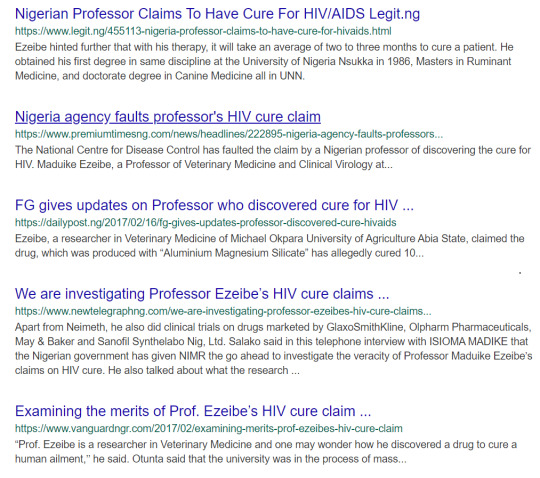
Lots of articles from newspapers of different political sides, half of them written by Nigerian authors, all of them suspicious of this finding, for valid reasons.
Now if you don’t believe news websites (I mean, me neither on some topics but not on everything, but that’s another subject entirely), you can examine the articles more in detail.
The first thing you want to search then is in which journal was the article published ? If you come from a news website you will have to go back to the original article, it’s sometimes a bit of a hassle because newspapers can be shit at citing their sources, but every scientific finding is published in a journal in a very codified way. However not all those journals are equal ! If you can be pretty trusting of any journal published by Springer, Elsevier or Wiley, some more independent ones will require further examination. Indeed in science, whether it be STEMs or humanities, there is the notion of predatory journals. Those journals that send hundreds of emails to researchers, and will publish any article as long as the authors are paying, like this Chinese journal publishing last week a joke article linking electric scooters accidents and hydroxychloroquine without checking it. Luckily, you can find lists of predatory journals that are updated and checked regularly, here are three of them: [x] [x] [x]
Now, not all articles published in those journals are false science however. And some journals are balancing on an edge between pseudoscience and really cool weird findings that could find no other publisher, like PLOS One which has some really interesting publications, and some others with a more -ah- discutable review I’d say. At this point if you still are not sure of how accurate the article is there is only one solution: you have to read it.
When reading an article to try and fact-check it, you are basically doing the job of a reviewer, and that is searching for some specific items. First of all look at the references: how many are they ? Are the citations concentrated in the introduction, as if the author was just trying to show how relevant they are, or are they disseminated throughout the text to explain some models and comparisons and draw common points and differences with other systems ? What proportion of the references are self-citations ? In those citations is the author working alone ? or are they in a team ? Are the co-authors always the same and if yes is it the continuation of a project ? or are they changing, and from various labs working on a similar domain and sharing their expertise ? I would say if the author is quoting themself a lot (as in maybe over one third of the references being themself), if the team never changes when the subject does and everyone seems to be in the same lab, I would be wary, but it can also mean that they are leading the way on a particular topic (that was the case of my team director last year, the lab had conceived a new composite material and was naturally the first to publish on it regarding different aspects), in which case if you’re really curious you can go even further and see how many citations in other works those references have. If it’s a lot of self-reference on different topics that are almost not cited by other authors that’s a huge red flag.
Other things to look for are the sample sizes, the statistics and the calculation for the error margins, especially if the sample sizes are small (small being generally under 100 for complex systems), if there are figures how are the axes ? Are there error bars ? How are these error bars calculated ? Are there guides for the eyes ? do those look coherent or could any other guide be placed instead and the conclusion would change ? If there are models are those deducted over a hundred data points or just three ? Where do these models come from ? If you’re feeling in a math mood you can try to look up the scientific units in the formulae to see if they’re homogeneous or full bullshit but that’s getting a bit too invested.
With all those hints you should get a better idea of how precise the researchers were and whether the article is interesting or if it is full of false claims ! Of course it cannot prevent genuine error like when we thought we’d proved the existence of superluminal neutrinos, but at least it should stop you from reblogging sensationalist titles leading to a general distrust in scientific research.
If you’ve come this far thank you so much for taking the time to read this !
#long post#here ya go#I tried to be as exhaustive as possible#predatory journals#pseudoscience#peer review#how to make the difference
485 notes
·
View notes
Text

The time has come!
The collection has been opened up and all of the fics we have received are now available to be read... except no one knows who wrote what!
Here’s the full list of all the remixes that were created for this year’s Winterhawk Remix in alphabetical order. There are 18 fics in total, so that should keep you all going for a while, and maybe you’ll rediscover some old favourites when you see what has been remixed!
Note that, while we’ve included ratings, to conserve space, we have not included tags, so make sure you check them out when you click through! Fic responsibly, folks.
And now, without further ado...
Go forth and read!
[Remix of] Is That The Fangs I Get? (Rating: Teen) A remix of @downwarddnaspiral’s Is That the Fangs I Get? “He does know, right?” “Know what?” “That I’m a vampire.” “Oh! Yeah. He’d have to, right?” Behind Bars (On The Other Side Remix) (Rating: Explicit) A remix of @captn-sara-holmes’s Behind Bars If Clint had known that hooking up with his cellmate would lead to escaping prison, making it all the way to Wakanda without being recaptured, and convincing King T'Challa and Captain America to let him stay once he got there, then he'd...well, he'd probably still have kissed the guy. Bucky was smoking hot, after all. Clint just really hopes he doesn't get mad when he finds out that Clint's been telling everyone he's Bucky boyfriend. Bottom of the Sea (just don’t go without me remix) (Rating: Teen) A remix of @verdantmoth’s bottom of the sea It was on his way out that he saw it. It looked pretty innocuous, like a bedroll or someone's discarded coat, but he knew it as soon as he saw it. His mom's had looked the same way, too long unworn and faded around the edges, but still silky smooth and beautiful in the right light. Clint limped over and grabbed the skin, draping it over his arms as best he could, trying not to touch it too much with his hands and the crusted-in blood under his fingernails. By Faith Alone (Rating: Teen) A remix of @badacts’ sola fide Bucky's daemon knows full well what he wants, but it's going to take a while for his head to get onboard with his heart.
Fractured, a Splintered Remix (Rating: Explicit) A remix of @flawedamythyst’s Splintered Clint touches something mystical at Dr. Strange's place and next thing Bucky knows, there are four extra Clints running around. He takes it upon himself to gather them up and help them come to some important realizations about the world. You know. Sexually. I dreamed I held you in my arms (Rating: Teen) A remix of @fadedsepia’s Like Sunshine He’s just about managed to focus on the mission, mentally reviewing the details of the target, when Clint strolls out of the bathroom, long and lean and — “You’re wearing that?” James finds himself saying. Clint stops short as he loops the purple aid around his ear and presses the earmold in, sky-blue eyes wide and startled. “Yeah? Why — is there something wrong with it?” James can’t help himself, his eyes wandering the slow course from head to toe. The dress shirt is mustard-yellow, linen so fine that it’s practically transparent. The collar is unbuttoned almost midway, showing the sharp jut of Clint’s collarbone and a slice of freckled chest below. The residual steam from the shower is already making the fabric cling to Clint’s incredible musculature. It’s fucking obscene. i hope i'll see you when it's light (the remix) (Rating: Teen) A remix of @nightwideopen’s i hope i’ll see you when it’s light After the fifth time they sleep together, Clint knows he’s in too deep. I Still Choose You (The Public Domain Remix) (Rating: Teen) A remix of @1000-directions’ i don’t have a choice (but i still choose you) Clint really didn't intend to do anything more than make a joke, but when his stupid 'soulmate' comment gets posted on social media, he ends up in a fake relationship with the one person he wishes really were his soulmate. Just Being Neighbourly (The Remix) (Rating: Teen) A remix of @mariana-oconnor’s Just Being Neighbourly Bucky can’t remember the last time he worked this hard to get somebody’s attention. He lowered the beaters into the mixing bowl with the speed setting turned up a little too fast, making his batter fling up in tiny flecks. “Jesus, again? What are you baking for now?” “Shut up, Stevie, and hand me the vanilla, damn it.” Make You Feel At Ease (Rating: General) A remix of @tintedglasses’ tell you truth, but never goodbye Just because it was Memorial Day and things in the past had definitely not been as kind to Bucky as they should have been didn’t mean that Steve needed to worry. But he also knew that man deserved a whole lot more good than that world had decided to give him. Novel Recognition (Rating: Teen) A remix of @lissadiane’s Blame It On Bad Luck Bucky tries to ignore the sudden change, the words that push to the surface of his skin some time between getting off work and getting Steve’s rail-thin ass up the stairs without falling or bruising any more of his best friend’s ribs, but… Why the fuck would it show up now? Bucky Barnes finally has a soulmate; someone he knows, but has yet to meet. Organic Chemistry (the remix of Improper Fractions) (Rating: Explicit) A remix of @cloud--atlas’s Improper Fractions Natasha's got a hot new roomate, and Clint's got a staring problem. The guy's a science teacher for fucks' sake. But if Clint doesn't get to suck his dick, he might actually die. Personal Security (Let's Go Steal Ourselves a Remix) (Rating: Teen) A remix of @kangofu-cb’s Personal Security Whatever his intentions, right now Clint’s a thief and a liar, and Bucky has worked hard to leave this kind of life behind him. It wouldn’t be fair to make a move right now. Push and Pull (Rating: Mature) A remix of @flowerparrish’s hey there, demons Bucky really wasn't expecting to see his one night stand at work the next day. right here, empty for days [a Written On My Heart remix] (Rating: Not Rated) A remix of @supervillainny’s Written on My Heart Soulmarks are funky lil' things. He can’t feel the lines on his skin, doesn’t know they’re there until he spots them. (Sometimes he thinks that’s a bit of a fluke on fate's part. What happens if ya miss ‘em? Or ya can’t see ‘em? Maybe fate knows though, which ones are meant to be seen.) safe and sound (finally safe remix) (Rating: Teen) A remix of @loonyloopylisa’s Finally Safe “I’m so sorry,” Clint says and it feels inadequate, but he doesn’t know what else to say. He thought he had a rough time waking up in that HYDRA cell, but at least he woke up somewhere else. He can’t imagine what it would be like to wake up in the same place he went to sleep, knowing that there’s no one else out there for him. “It wasn’t rare,” Bucky says, ducking his head slightly. “It was the thirties and healthcare wasn’t great and so it wasn’t rare for people’s soulmates to die before either of them reached twenty-one.” Bucky swallows hard again, his voice the quietest it’s been when he says, “But I guess I just never thought that it could happen to me.” susurrus (the one touch to know remix) (Rating: Teen) A remix of @drgrlfriend’s A Murmur in the Trees Sam Wilson has a nice place. It’s also conveniently located across the street from a small park with several old, heavily-in-leaf trees with an excellent vantage of his windows. Clint, settled high in the canopy in the vee between two sturdy branches, watches a weary, limping Cap arrive fresh from the hospital through binoculars. It’s embarrassing that this is what his life has come to. take a snapshot (dirty laundry remix) (Rating: Explicit) A remix of @thescarletwitch’s Take a Snapshot (If It Makes You Feel More At Home) You know this is basically soft porn, right?” Clint murmurs with a sly grin, cupping his own dick through his pants before shaking his head and laughing. Clint, like Clint Barton. Like the Avenger. Fuckin’ Hawkeye, for fuck’s sake. The not-so-secret love of Bucky’s very gay life. “Nothing soft about it,” Bucky mutters to himself. Clint and Bucky get dirty at the laundromat.
-
Author reveals will take place on 30th June. Until then, have fun reading and enjoy the mystery!
196 notes
·
View notes
Text
Frankenstein; or, the Modern Prometheus by Mary Shelley
I got a giftcard for an audiobook service, so I listened to this one as an audiobook narrated by Alison Taylor. I never knew much about this book or of its’ creator until recently when I watched the Mary Shelley film on Netflix. It painted an interesting image of the woman and the book! I was therefore intrigued to read the book and quite honestly it was very different to what I had previously imagined, although the film had hinted towards that already.
Background: The story of Frankenstein started as a short story in the summer of 1818, when Shelley was travelling in Europe with her future husband and they stayed in Geneva with Lord Byron. In order to amuse themselves Lord Byron came up with the challenge that all the people present should write as scary a ghost story as they could, which initially prompted Mary Shelley to come up with the idea for Frankenstein (and another guest, John Polidori ended up writing the book “The Vampyre” without which Twilight might never have existed you know).
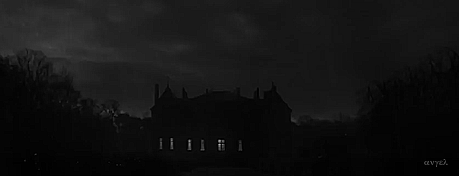
Synopsis: The way that Frankenstein is written is interesting for it is written both in epistolary form and in the form of a frame story, where one of the characters begins by telling Frankenstein’s story in a letter to their sister, but within that narrative Frankenstein also explains the monster’s side of the story. So it’s a bit like a story within a story within a letter within a book. So many layers. Like an onion. The story also opens at scene set in the North Pole, when the actual story is drawing to a close. Frankenstein is chasing his monster when he comes across a ship which is on a scientific discovery voyage, and so Frankenstein begins to tell the story of the monster.
Victor Frankenstein studied in a university where he became intrigued by the idea of creating life or bringing dead to life and so he begins to work on what will become his monster. It’s not his intention to create a monster but when he sees the creature he has brought to life Frankenstein is terrified of it and wants to abandon the monster. The creature however, does not wish to be abandoned, feels lonely and tries to find companionship where he can. Because of his appearance it’s not easy for him and so he wishes for Frankenstein to create a partner for him. He does not wish to create another “monster” and this is when the original creature he created really turns on his creator.
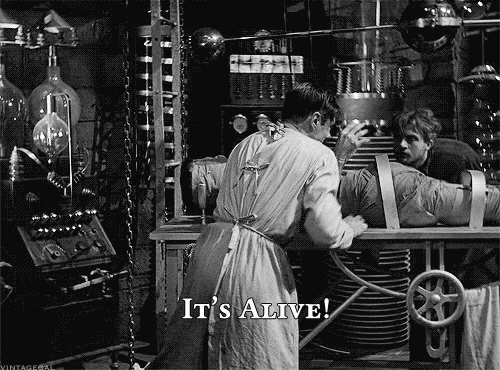
Review: I rated Frankenstein at 4/5 stars. Although Frankenstein is supposed to be some sort of a horrid ghost story, I did not find it actually scary, but rather sad. Without spoiling too much, let’s just say that I’ve seen the meme which says something like “everyone thinks that Frankenstein is the name of the monster in ‘Frankenstein’, but this is incorrect. However, if you read Frankenstein, you realise that he, in fact, is the monster” and let’s just say that I finally understood it. In the Mary Shelley film I’ve seen it is alluded to that in her marriage Mary Shelley herself might’ve, at times at least, felt as lonely as the ‘monster’ did when he was cast aside by his creator. Throughout the story Victor Frankenstein fails to take responsibility for his actions and therefore is responsible for more damage than his creature. The creature merely wants to feel more human and less alone, which Frankenstein fails to understand or take seriously. Because of this Frankenstein also drives himself to feel isolated from other people. I think that humanity, responsibility and loneliness are some of the greatest themes explored in this novel which Shelley manages to do justice for.
So I enjoyed the narrative perhaps more than I had expected and the themes it explored were interesting to me. The pacing of the book was a bit off however, therefore not worthy of five stars for me. Like I said, I listened to this as an audiobook, and had I been actually reading myself, I think that I would have found the start of the book a bit difficult to get through, but the story does pick up and get better! The pacing could’ve been improved throughout the book but generally the beginning was the slowest bit. If you struggle with it, I suggest trying an audiobook. Since it’s in the public domain, you should be able to find one easy enough on YouTube etc.
I recommend this to fans of classic, gothic novels, or to people interested in the history of the science-fiction genre!
#book review#classics#classic lit memes#classic literature#classical literature#classic books#book classics#frankenstein#mary shelley#mary shelly's frankenstein#Mary shelley's frankenstein#frankenstein's monster#frankenstein's creature#horror books#science fiction books#gothic novel#onlyperioddramas#period drama
28 notes
·
View notes
Text
Copyright, Fanfiction, and Fanart
(For the original discussion I posted in Reddit, click here. Also, there's a lot of debate in the comments about different perspectives on this that's really interesting! I recommend giving it a read if you're interested in other perspectives).
This post is about copyright. A little bit about what it is, what it means to the fanfiction writer, and also, why sometimes fanart gets special treatment in being able to monetize their art as compared to fanfiction.
There's been a lot going around lately about fanfic writers wanting to profit off of their fanfics, and this is a bit of a "fyi" on why you really really shouldn't try.
Just to get the ball rolling: you should not make money off of fanfiction. At least not off of anything you've written that is not currently public domain. It is illegal.
[This is not a statement of whether it will eventually be right or wrong to make money off of fanfiction, or whether in theory it should or shouldn't be allowed. It is, however, stating that as of right now, do not try to make money out of fanfiction, both for your safety, and the safety of the fanfiction community as a whole].
There are reasons for this, and I think it's worth explaining for those who don't know (or at least providing one articulated reason). For those who do, well, maybe you have differing opinions. Some of this isn't based on opinion, though, just for reference. Some of this is the fact of how things work (particularly in United States law).
Fanfiction, in its plainest description, is writing in someone else's idea. Someone else's idea that is copyrighted the moment it is written in a fixed (tangible) medium. That means the moment something is written on a napkin, it can be put under copyright. The moment it is recorded in a voice memo, it's under copyright. It just has to be out of your head in some way.
Now, of course, napkins and little voice memos may be disputed. For the most part though, if the medium has fanfiction about it, the medium is large enough that the source of the idea can be pinpointed without dispute.
Copyright protects the originator of the idea's idea from being stolen by other people. It ensures that the owner of the idea is the one who reaps the benefits of their creation. It is akin to a patent for ideas. That is why there is also a point where copyright disappears and the idea becomes public domain. That's another deal for another time.
[for clarity: parodies, critiques, and educational purposes are not treated as a breach of copyright for a variety of reasons. That is why the New York Times can make money on book reviews, for example, or why you can see things like Vampires Suck or SNL mocking Twilight].
Also for clarity, unlike trademark, there is no "use it or lose it" requirement. There is, however, a "protect it or lose it" requirement. Some creators are more dedicated in this protecting of copyright than others.
Fanfiction used to be far more contested than it was now. Decades ago, archiveofourown wasn't possible. The fact of the matter is, fanfiction is a privilege that was hard won. Which means that every time there is someone who attempts to make money off of fanfiction, that privilege is put at risk of being taken away. Don't believe me? There are authors who have made a hard stipulation against fanfiction, and -- you may correct me if I'm mistaken -- Fanfiction.net doesn't allow you to post those fanfiction using those author's books.
Which also, this isn't me bashing on those authors. They have every right to protect their idea.
The concerns authors have with fanfiction is, for the most part, twofold.
One: they will have profits lost due to other people in the world of their original works, even though it was their idea in the first place. There isn't just market competition in their genre that they have to fight against, it's competition in their own idea.
To explain, it's similar to the fact that you can have a new pizza restaurant to add to the market, but you can't call it Dominoes and steal their recipe and claim it as your own because it has little additions and flourishes. At that point, you are not only benefitting from the fact that Dominoes is an established name people may confuse your pizza with, but you are stealing profits that would be going to Dominoes pizza. Copyright protects not only the owner of the idea, but also the consumers who are trying to find the originator of the idea.
Two: if enough people begin to make money off of their own idea, their claim over their own idea starts to diminish. This not only lowers the amount of profit they can make on this idea, but also diminishes their control over their own idea.
The concept that I think of that's comparable to this is adverse possession of property (squatter's rights, for example). If enough people sit on another's property for extended periods of time and do nothing about it, eventually that property isn't theirs anymore. They lost control over it, they can't make money off of it, the value of their own property goes down because that space is gone.
So that's copyright. That's why fanfic writers cannot make money off of fanfiction. It's literally stealing, and is unfair to the original creator.
Now, many people ask, why don't fan artists get the same flak? Why can they make money off of making art based on an idea that wasn't their own?
And the answer may not be satisfying, but it's the truth: fan art is never going to be as policed as fanfiction because it works much more like free promotion for people's original ideas.
(There's an argument that fanfiction is also free promotion, but it's not nearly as effective as fan art -- same logic that goes into why advertisements for products are more visual than wordy.)
Think about it. Original creators love fan art. Video game creators post it on their websites, streamers make it stickers for their twitch services, authors pin it to boards and put it on tumblr and twitter and instagram.
Art takes seconds to process. A picture being worth a thousand words is debatable, but the processing time of a picture over a thousand words makes a picture that much more effective if you want quick access. People see it and go "ooh, what is that?" and then try to find what the artist is referencing. Then they stumble upon original creator's idea and are like "oh, now I'm interested!". They go to the original creator's idea and consume the original creator's works.
Yes, fanfic readers do read fandom blind sometimes, and sometimes fanfiction can spur people to go to the original creator's work, but it's less likely. At least for me, personally, I read a fanfic of someone and I'm inclined to go to that fanfic author's page -- not the original creator's things (now, the original creator's idea is why I'm in that fandom often in the first place, but, you get my drift).
(side note, someone made a very good comment on the reddit post -- they love fan art until they don't. Look to all the artists who initially made baby yoda merch on etsy only to have Disney go after them -- again because the individual artists at that point are taking profits away from the company).
Furthermore, unlike fanfiction, fan art doesn't (usually) give the impression that there's an attempted improvement upon the original creator's idea. (Not to say that every piece of fanfiction is stating that there's a flaw with the original work, but) a lot of fanfiction does stem from corrections, wish fulfillment, etc. Fanfiction is often the act of taking what people wish they could see in an original creation's idea and bringing it to life.
Fan art doesn't necessarily do that. They may just be painting a scene that occurred in the original work. They may just be drawing up their idea of what a character looks like. They're creating alternative visuals to the original work, but they're (generally) not adding plot bunnies or changing the story into something that people may end up enjoying more.
Now, there are artists who make aus and things like that, but again, it's the fact that people look at a picture and then move on. People don't stare at a picture as long as it takes for them to read a fanfic. The time taken away from the original creator's idea is not nearly as long from art alone. And time is money.
In short, fan art is free advertising that often doesn't divert consumer interest away from the original idea. Fanfiction doesn't operate as free advertising and often does divert consumer interest away from the original idea. That's why fan art is not going to get the stink eye from original creators, where fanficiton often does.
And again, original creators have the right to protect their idea as they see fit within the bounds of copyright.
Remember, the original creators of the works that we all love to write fanfiction about put a lot of heart and soul into making their ideas. Many creators who have fanfiction followings are not the big conglomerates with oodles of money to spare. They are just diehard lovers of creating, just like everyone here. Which is why the protection of their ideas is important and absolutely valid. I love writing fanfiction, but fanfiction needs to be honoring the original material, not screwing it over.
Thus, the main lesson from this? Fanfiction and fan art are not the same, and do not operate similarly. Thus, though fan art can make money off of their creations without getting policed, fanfiction writers I implore you: Do not attempt to make money off of fanfiction. You put the entire community of fanfiction writers at risk of having their past time taken away from them every time you do.
(I am saying this including kofi and patreon. Do not try to make money on fanfic through kofi and patreon. There may be a legal loophole there, but you don't want to find out by getting a cease and desist letter that your legal loophole via patreon and kofi didn't work --- furthermore, you put kofi, patreon, and potentially archiveofourown/ff.net at risk, then, too).
For now, fanfiction is a labor of love that can only receive a profit of love. Please do not try to get paid for your fanfiction. Protect the fanfiction community.
Thanks for reading!
#fanfiction writer of tumblr#fanfiction faqs#fanfiction discussion#copyright#questions#potential answers#protect the fanfic writing community#it's okay to be butthurt about not being able to make money#but please don't try to make money#at least not until the legally gray area of fanfiction gets resolved#hopefully in fanfics favor#fan art compared to fanfiction
3 notes
·
View notes
Text
Wondering Wednesdays, Baby Acres, Chapter 2: Infrastructure, with words!
July 21, 12021
books
,
Coop
4Freedoms
,
health
,
mywritings
,
PublicDomainInfrastructure
,
writing
This post starts the rough draft of Chapter 2 of my non-fiction WiP, Baby Acres.
This chapter will have about 2500 words, (hopefully educational words!!) 500 of which have already been written as the Introduction, but will quite likely have to be thrown out and refitted with the new evolution of the book. We shall see.
And again, by way of disclaimer, the overall goal is now to explain why we need both equ. + justice, & why in 4 phases. This chapter will transition to a chapter (2-5) for each phase, showing what Phases I-IV could look like as part of a possible roadmap for a fully inclusive society for all of us. This vision is laid out in the hope that All HumanKind will eventually have each person’s basic needs met, without taking anything from anyone, and without violence, intimidation, nor coercion of any kind.
Chapter Two:
( Chapter 2’s outline was last week…)
Chapter 2 Introduction:
The first stage of this project involves building empathy, and bringing each one of us to see each one of our fellow human beings as … a human being. Each one meriting humane treatment, and human dignity.
That empathy building phase was Phase 0 (yes, I’m a computer scientist by first training, so I start with 0…). Phase I is meant to go for fifteen years, potentially from the years 2022 to 2037, building a movement to strengthen some of our most crucial and obviously key pieces of our social infrastructure, which are in the public domain. During this period, one of the ways that we can both build conceptual support and also literally build our physical infrastructure that needs support, is by borrowing an idea from President Franklin D. Roosevelt, which worked during the Great Depression to create jobs while educating young (white) men at the same time. What we want to do now, is to educate, facilitate service, and build a community-service frame of reference, while also upgrading our public infrastructure, just as FDR did in the 1930’s via his program.
Bringing back an updated version of FDR’s Civilian Conservation Corps (CCC), or Roosevelt’s Tree Army, as it was popularly known, could provide a stepping stone between the empathy- building work that must always be on-going, and the support-building work of bringing our society to a consensus on the needed support for the most basic of our public social infrastructure institutions, like Public Libraries, Public Transportation, Public Education (especially in the financial and legal areas, where so many consumers fall prey to financial predators, and end up in debt due to lack of knowledge), and Public Health. These four systems under gird our entire societal structure, and need support perhaps the most urgently, in return for which we potentially get the most payback for all members of society. While we do the difficult work of building the necessary consensus to get there from here, a simpler step might be to bring back some form of the CCC, updated to be far more inclusive, and used as both a means of providing employment to young people, and also to educate them, much like the Gap Year in Europe.
But instead of having our new high school graduates backpack around the country, they could be sent to work in urban public library branches, light-rail and subway/Metro stations, local urban public schools, or inner city health clinics. As they rotate from one part of the country to another, say, monthly, they learn first-hand of the conditions in places they are not from and have not lived, while serving communities they have never met, working alongside peers from different walks of life, and seeing a side of their native land that they did not grow up with. In short, learning the realities, and different perspectives, of this large and diverse nation of ours.
— (Next Wednesday: Chapter 2, section I …)
I’m considering this Rough Draft as the block of clay from which my book will eventually emerge, obviously, and some ideas for phases III and IV are still becoming more fixed in my mind as I write, so the final version will likely look pretty different from this Rough Draft, and will need updating once I get to the very end.
And once again, yeayyy( !!)with regard to audience, I may have at least a couple of comps: Walden Two meets The War on Poverty: A Civilian Perspective (by Dr.s Jean and Edgar Cahn, 1964). I know that lots of people consider Skinner’s writing to be stilted, but I like the tilt of most reviewers, in that the idea is that a community should keep trying policies that members agree upon until they find what works for all of them.
As for genre, I’m still wondering: Non-fiction, System Change, Causes, maybe even Inspirational, but I doubt it.
Last week’s installment of this series…
Action Items:
1.) Consider some ideas you may have on how our society can solve the problem infrastructure upgrades in the next 15 years,
2.) Share them with us in the comments, here, please, and
3.) Write a story, post or tweet that uses those sources and your thoughts.
Dear Readers, ideas on learning, especially multiple #LanguageLearning, on-going education and empathy-building, to #EndPoverty, #EndHomelessness, #EndMoneyBail & achieve freedom for All HumanKind?
Support our key #PublicDomainInfrastructure & #StopSmoking at LEAST for CCOVID-19: 1. #PublicLibraries, 2. #ProBono legal aid and Education, 3. #UniversalHealthCare, and 4. good #publictransport Read, Write -one can add Stayed on Freedom’s Call via this GoodReads button: ,
Vote, Teach and Learn (PDF Lesson Plan Book)!
and my
Babylon 5 review posts
, if you like Science Fiction, and a proposed
Vision
on Wondering Wednesdays: for a kinder world…
Shira Destinie A. Jones, MPhil
our year 2020 CE = 12020 HE
(Day 1 … Day 5)
Stayed on Freedom’s Call (free copies at: https://archive.org/details/StayedOnF…) includes two ‘imagination-rich’ walking tours, with songs, of Washington, DC. New interviews and research are woven into stories of old struggles shared by both the Jewish and African-American communities in the capital city.
Shared histories are explored from a new perspective of cultural parallels and parallel institution-building which brought the two communities together culturally and historically.
Please leave a review, if you can, on the GoodReads page.
Shira Destinie Jones by ShiraDest is licensed under a Creative Commons Attribution-NonCommercial-ShareAlike 4.0 International License.
1 note
·
View note
Text
k now that I’m at my computer here’s why tumblr’s dogshit response to everyone pointing out that monetizing fanworks is going to end badly is honestly kinda pathetic for how little it actually explains. I’m going to focus on the copyright section specifically.
ALSO KEEP IN MIND THIS RESPONSE COMES AFTER TUMBLR GOING “MONETIZE YOUR DESTIEL FANFIC�� WITH NO FURTHER EXPLANATION OF WHAT FALLS UNDER FAIR USE OR IF WE GET PROTECTION FROM BEING SUED!
Now, first point.
“Fanfiction and fanart are frequently considered fair use and we support our Creators’ fair use rights. Monetizing fan work does not necessarily mean that it isn’t fair use.”
This is technically true, I’ll admit. What falls under fair use or not is actually a pretty blurry category, and transformative art should fall under it but it’s also a pretty grey area. Technically copyright law exists to protect the IP owner’s share of the market. I’d suggest Lindsay Ellis’s videos on the entire a/b/o lawsuit since she does a pretty good job of explaining copyright and fair use in relation to the transformative aspect and monetization (also it’s hilarious, like classic fandom drama only the fucking courts had to explain a porn trope and features the phrase “wolfcock Karen”). But basically the logic is if you transform it enough, it ceases to cut in on the owner’s market and so it’s fine.
But also we have to remember that fair use is also pretty subjective. A review or a parody is likely to get away with it, but outright fanfiction will likely fall under copyright law. Remember when the day of the Great Gatsby becoming public domain there was suddenly a dozen books based on it on the market? Yeah, that’s because the threat of copyright law had ended. A good rule of thumb is that if the “trademarked” aspects of a work are present in a different creative work, it’s going to get you sued. So me writing about Harry Potter and Ginny Weasley having hot steamy sex might get me sued, but Larry Smith and Veronica Kingfisher fucking in the Perfects bathroom of generic magic school Ludwedge is probably fine. The fandom generally knows this practice as filing the serial numbers off. Change enough key stuff and switch out the names and they can’t really touch you.
Which, y’know, means most fanwork is still going to fall under copyright because it’s the brand not just the contents. Anything labeled as fanfiction of a copyrighted IP or is recognizable as one is under the threat of copyright.
(this also doesn’t even mention the power imbalance between companies and individuals and how the DMCA operates so typically individuals or indie creators can’t do much if a DMCA is filed unless they have the money to bring it to court, and if a company decides to sue someone for copyright they’re pretty much screwed because they can’t match the resources of a large corporation)
“Any content posted on Tumblr, both free and monetized, should follow our Terms of Service and Community Guidelines, which prohibits infringing the intellectual property rights of others.”
Yes, which means it can’t be monetized fucking god Tumblr you can’t just cheekily say we can sell destiel fic and then after everyone points out it’s going to get us sued bring up the TOS like you didn’t outright say we could do it like this is exactly what we’re saying we can’t monetize it without losing the protection of fair use.
“Whether a piece of fanfiction meets the requirements for fair use varies depending on the work.”
Tumblr this is a super blurry line we’re walking here. Yes, some fanwork does fall under fair use but the vast majority does not and you just gave us a blanket statement that we can just... monetize it. Even when we do monetize fanwork it’s usually low-key and under the radar. It’s why patreon and ko-fi work so well, it’s hard to connect the creation of fanwork to an exchange of money, and the companies are usually fine looking the other way so long as we’re not super obnoxious about it since it’s free advertisement and they don’t want to alienate consumers. Making it official on such a large scale is going to bring the lawyers down on us like God killing Egypt’s firstborns only God is Mickey Mouse and the crime was a monetizing a Loki gifset. Even smaller creators, they have to enforce their copyright to keep it and make money so they don’t starve which means lawyers and DMCAs and souring their relation with their fans like this is a whole ecosystem your messing with here. And if it doesn’t fall under fair use, I wouldn’t be selling it on goddamn Tumblr anyway. I’d go start a patreon like a smart person, or try to self-publish.
ALSO! Big scary companies don't pick a fight with ao3 and the OTW because they have a strong leg to stand on with how it’s not monetized (it’s why they won’t allow ko-fi or patreon links on ao3) and they also have lawyers. The fact Disney hasn’t gone after AO3 tells us this position is solid. You do not have lawyers, at least not ones who will protect us. And once again mass monetization is going to disrupt the delicate balance of companies looking the other way with fanwork which runs of the risk of ruining the unofficial system we have now.
“Intellectual property rights holders are in the best position to decide if they think a fanfiction or fan art violates their rights. If they do, they can use the normal Tumblr DMCA process to identify content for removal.”
Fuck you. Like seriously, fuck you. Ignoring the fact that the DMCA is often applied in draconian ways since most big websites don’t check whether or not a thing is fair use, giving IP holders the right to pick and choose? Fuck you. Like first of all, monetizing stuff on this scale will result in companies just trying to take down everything being monetized, they’re not going to pick and choose. And even if they do, they can still abuse this system to take down the things they just don’t like. The queer stuff, the kinky stuff, any topics that are heavy or controversial, ect. And I’m sorry but most fanwork does fall under what the DMCA is actually supposed to take down even when it’s not being abused, at least if monetized.
“Creators can also take advantage of the normal counter-notification process if they believe the content was misidentified as infringing.”
Tumblr. I do not trust you. The nazi blogs and pornbots are still up yet other blogs get nuked or shadowbanned for far less. Cyberbullying is a real problem on this site. Complaints go frequently unanswered. You won’t listen to your userbase. You won’t even fix the most basic things. And you want me to think you’ll listen? Or stand up for us when the next Anne Rice threatens to sue us? No. Stop it. Just find some other way to generate revenue, I get that you need to but this is going to end in disaster
1 note
·
View note
Text
Dumbo at 34
A review by Adam D. Jaspering
We remember things as we want to remember them. Memories distort perception and perception distorts reality. Childhood is especially remembered well. If not the entire childhood, elements. People romanticize memories from the feelings they evoke, and discard the reality.
The circus is a prime example. The circus was once a staple of American pleasure. It brought entertainment, excitement, and exotic animals to small towns across the US. In days before the internet, before TV, and before movies were mainstream, it was a necessity.
People remember the old-timey charm, the whimsical environments and otherworldly aura. Nobody wants to remember the adverse working conditions, the high rate of injury, or the gross abuse of animals. Nobody remembers the smell of port-a-potties or the heaps of animal manure. People remember the calliopes and cotton candy.
It’s quite appropriate Dumbo takes place at a circus. Everybody remembers the movie fondly, but nobody seems to acknowledge its flaws. It’s heralded uncontested as a Disney masterpiece despite a number of problematic issues.
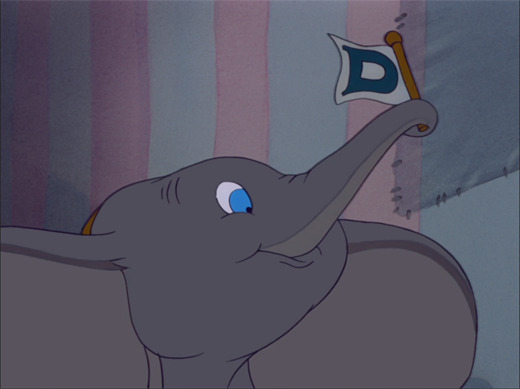
For starters, the film is only 64 minutes in length. This includes the opening credits. From a logistical standpoint, one can understand the purpose. Disney Studios took a financial hit from Pinocchio and Fantasia. They needed something not only profitable, but cheap. The same way that a three-wheeled car saves money on tires.
The story of Dumbo is one of growth and confidence when faced with adversity and doubt. However, the plot is about a young elephant finding an act in a circus. Dumbo tries, and he fails. He tries again, he fails again. Finally, he tries and he succeeds. An entire plot thread seems missing from the film. Dumbo learning to fly (both literally and figuratively) should support a larger narrative.

There are no stakes for Dumbo. His failures don’t affect the circus’s income or popularity. Dumbo is ostracized, but still cared for as well as any other animal in the show. He is ridiculed, but still performs every night.
The movie ends before any growth or change is displayed by the secondary characters. Everybody likes Dumbo once he can fly, but do they like him, or do they like his profitability and popularity? If a lion with an extra long tail is born, will he be mocked until he earns respect too?
Everybody in the circus feels comfortable calling him “Dumbo” at the movie’s end. Canonically, his official name is Jumbo Jr, named so by his mother. Everybody calls him Dumbo, a deliberate insult. The name sticks, even for the viewing audience. Either Dumbo begrudgingly accepts this epithet, or reclaims it. Either way, at least his mother should refuse it.
Dumbo’s mother is Mrs Jumbo, a pariah and outcast among the other circus elephants. What causes this exclusion is never explained or hinted at. The other elephants are just jerks. She has no friends, no confidantes, and is apparently widowed; there is never a mention or allusion of a Mr Jumbo. She has nobody in her life. This is presumably why she is so desperate to become a mother at the movie’s inception.
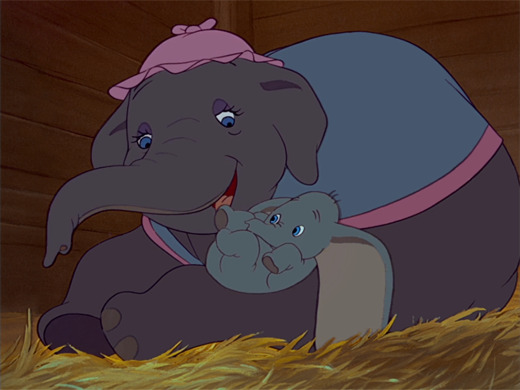
The film begins with a muster of storks delivering babies to various circus animals. It’s a cartoon staple and a very convenient workaround, explaining the miracle of a baby without the depiction of childbirth or implications of procreation. It also justifies how Dumbo is born despite there being no male elephants anywhere in the circus.
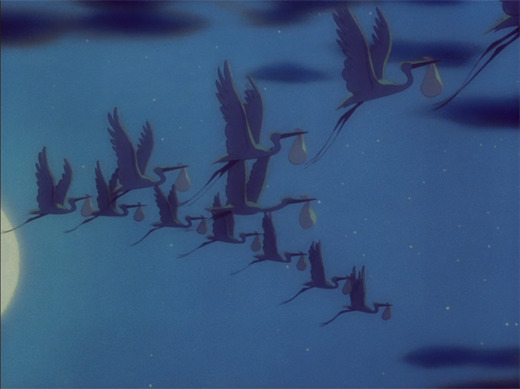
For whatever reason, these storks all deliver their parcels on the same night. All except for Mrs Jumbo’s coveted baby elephant. Baby Dumbo is delivered the following day. After seeing everyone else enjoying their children. After her hopes are dashed. There’s no explanation why the stork arrives late, well after the circus is dismantled and loaded aboard a train. Dumbo is delivered a day late for the sake of drama.
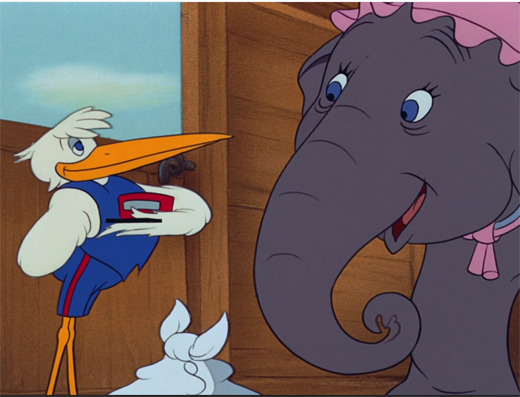
The train itself is almost a character itself. It has a name: Casey Jr. It has a face. It emotes. It speaks. But can he be rightfully called a character? Casey Jr doesn’t interact with other characters. He has no goals or desires besides acting and moving like an ordinary train. It’s an odd design choice, leaving Casey Jr halfway between being a robot and the pathetic fallacy.
Casey Jr is an interpretation of the famed children’s story, The Little Engine That Could. Casey Jr even uses the famous line, “I think I can, I think I can” as he climbs a hill. The story’s most famous interpretation was a 1930s picture book by Watty Piper (a name one could only have in the 1930s). The character and story itself belongs to the public domain.
It wouldn’t surprise me if somebody at Disney Studios tried and failed to make an animated short based on the story. As consolation, they retrofitted the character for a bit part in an unrelated, developing film. The cumbersomely named 'Little Engine That Could' was renamed ‘Casey Jr,’ and a new character is added to Dumbo's universe. A character Dumbo never meets or interacts with, and has no bearing on the plot. If nothing else, he adds five minutes to Dumbo’s anemic runtime.

Design is one of Dumbo’s weakest points. Human characters are hyper-stylized caricatures of actual people. Perhaps intentionally, so we empathize more with the comparatively realistic animals. But the animators went too far. The Ringmaster is so rotund, he seems inflated. The clowns have bizarre proportions which are somehow reigned in by their baggy costumes and floppy shoes. The rowdy child who assaults Dumbo looks more like a chimpanzee than a boy.
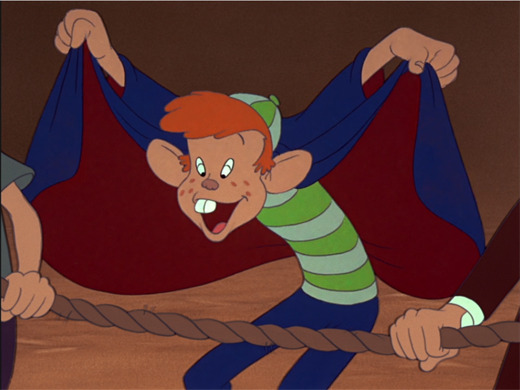
The character of Timothy Q Mouse is perplexing. Is he employed by the circus, or just a circus enthusiast who hangs around the fairgrounds after hours? What would a circus gain from hiring a mouse? Why does he dress like a bandleader? Does this imply an unseen mouse marching band? He never displays any musical ability. He’s there because the movie needs him to be there.
Being Dumbo’s sole friend is Timothy’s secondary purpose. His primary purpose is to outwardly verbalize the thoughts and emotions of Dumbo. Our protagonist is mute throughout the film and most characters avoid talking to Dumbo directly. Without Timothy, Dumbo would stare at camera sadly for the movie’s run.
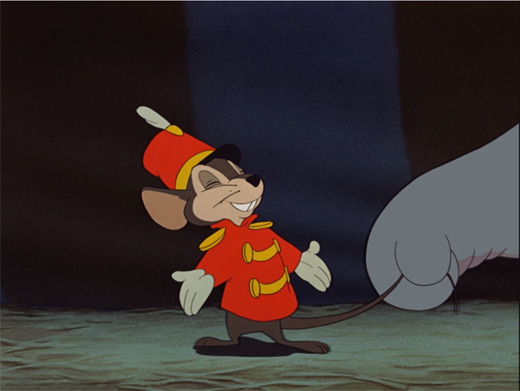
The circus folk themselves are weird, and not just their physical attributes. The Ringmaster is a bombastic Italian man who, as Timothy describes, “never had an idea in his life.” He seems genuine, eager to entertain his audience with an entertaining and original show. His real malice is never workshopping ideas. He will not hesitate to endanger the lives of his employees or animals on his fanciful whims.
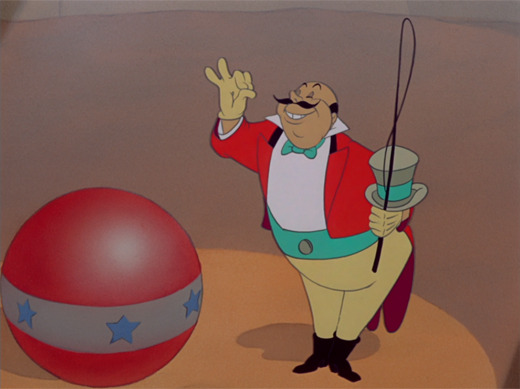
Can six full-grown elephants balance on a rubber ball? Who knows. Let’s put it in the show. Is it safe to have a baby elephant drop twenty feet into a washtub full of shaving cream? We’ll find out. Is it a good idea to start a fire underneath a canvas tent for the sake of a firefighter sketch? The audience likes it, so who cares? Go stand next to the fire, clowns.
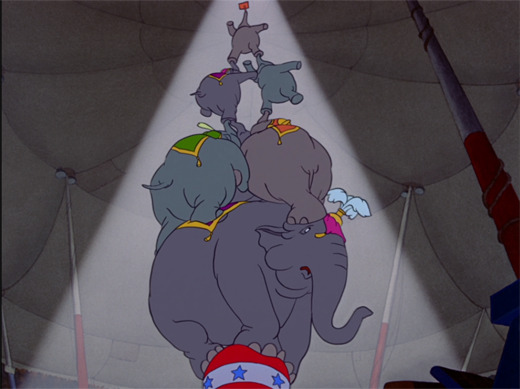
There’s an old adage about doing anything for a laugh, but the clowns from Dumbo take it to a sociopathic extreme. The clowns develop an entire act around humiliating Dumbo. When the skit is a success, they drunkenly decide to put Dumbo in more humiliating situations and more precarious stunts.
It’s implied the clowns are the low men in the circus’s caste; those who cannot perform elsewhere are subjected to the humiliation of clowndom. Does the scorn beget the malice, or did the malice beget the scorn?
Perhaps this is why the clowns are never shown as actual humans. Throughout the movie, they either appear in their grotesque, make-up clad personas, or in various states of undress as silhouettes inside a circus tent. At all times, they are either 100% clown or some spectral figure. They are never seen as human, because there is certainly no humanity to them.
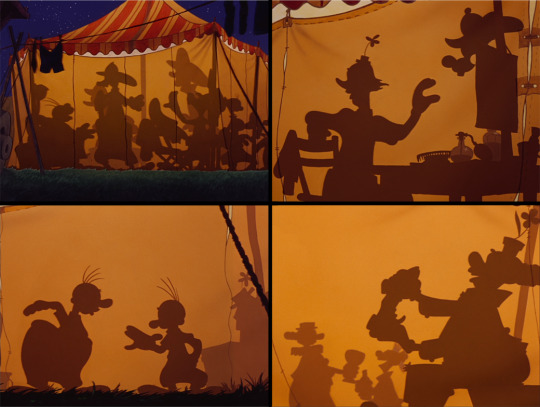
However, the most questionable employees are the laborers. The laborers are not entertainers; they have no face time with any circus patrons. And yet, they are the most important employees of the circus. They are responsible for unloading the train and erecting the many circus structures.
These laborers, tasked with the most arduous and backbreaking of work, are all large black men. As a stylistic choice, they are all depicted faceless. Not even worthy of dignity, they are robbed of any identity and distinguishing characteristics beyond skin color.
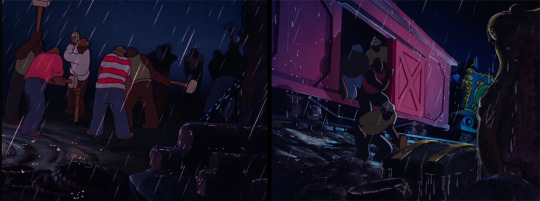
To cushion our objections, the laborers sing about how much they like the work. The song is no comfort. They sing about being illiterate. They sing about being underpaid, and routinely subject to wage theft. They sing about how its their very nature to be irresponsible with money. They literally use the word “slave,” and “ape” to describe their circumstances. Thank you, 1940s.
The only other black characters are a murder of crows introduced in act three. These crows must be less racist in depiction and demeanor than the laborers, right? They couldn't possibly be worse, right? Then one learns the leader of the avian posse was named “Jim Crow” on all Disney material until the 1960s.
The entire Civil Rights Movement needed to happen, but somebody eventually realized a children’s cartoon character named after the most provocative blackface character in history, the namesake of the American laws that enforced segregation, was a bad idea. It didn’t help Jim was voiced by a white actor. Cliff Edwards voiced Jim Crow (later renamed Dandy Crow), the same actor also voiced Jiminy Cricket in Pinocchio. Jiminy Cricket has appeared regularly as a beloved figure in Disney merchandise and material. Dandy Crow has not.
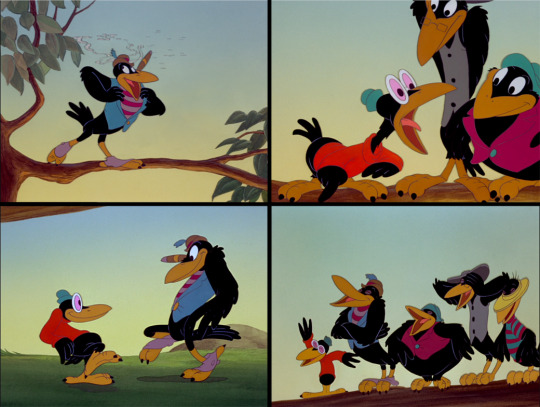
To Disney’s credit, the other crows were voiced by actual black actors. Although, one has to wonder if the AAVE was written into the screenplay, or if the director asked the actors to create it on the spot. There’s no good answer.
The crows’ musical number was performed by the all-black Hall Johnson Choir (with the exception of Edwards’s vocals). Their number, When I See an Elephant Fly, is one of the better pieces of music in the Disney catalog. It's full of jazz scatting and clever wordplay. It’s a shame its existence is marred by its racially charged source.
How an oversized pair of ears grants the ability to fly is not important. It’s a cartoon. The ears are a means to an end: the physical feature that made Dumbo a laughingstock also granted him a most unique ability. Differences make us strong. It’s a good moral (even if the film is hypocritical).
The depiction of the moral’s resolution, however, raises eyebrows. Upon discovering he has the ability to fly, Dumbo seizes the opportunity to take revenge on those who wronged him. He circles around the big top, swooping at the ringmaster, scaring the clowns, shooting peanuts at the other elephants like bullets from a machine gun. ‘Make your enemies pay,’ is the takeaway. Suffer all, enemies of Dumbo.
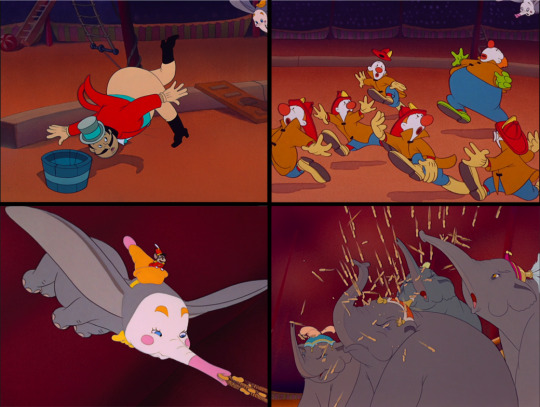
Some may argue Dumbo’s character arc is not redemption for himself, but for his mother. Mrs Jumbo spanks a young boy who assaults her infant son. The circus folk misinterpret this act as a rampage. She’s is subsequently shackled and imprisoned for the forseeable future.
Even after being deemed hazardous and mad, Mrs Jumbo is never sent away. There is no indication of punishment beyond isolation (why the circus keeps a dangerous rampaging elephant on circus grounds is a creative liberty). The true punishment is being separated from her son.
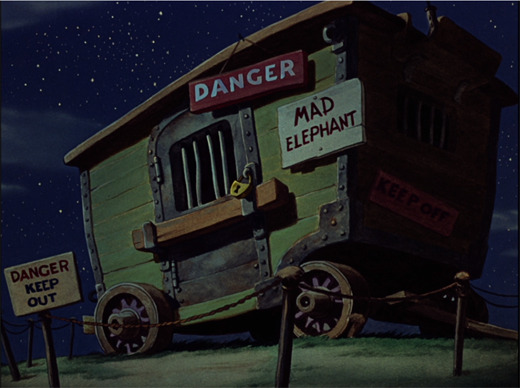
The movie ends with Dumbo as the star of the show. Everyone sings his praises, he has his own personal train car, and Mrs Jumbo is freed. The question is, why is Mrs Jumbo freed? Just because Dumbo is beloved, why is Mrs Jumbo’s perception as a threat forgotten? Why is she forgiven because her son is popular? Dumbo cannot speak, how can he serve as a character witness? Why does Dumbo's achievement redeem his mother's actions? The writers delivered a happy ending by solving a problem that was never actually solved.
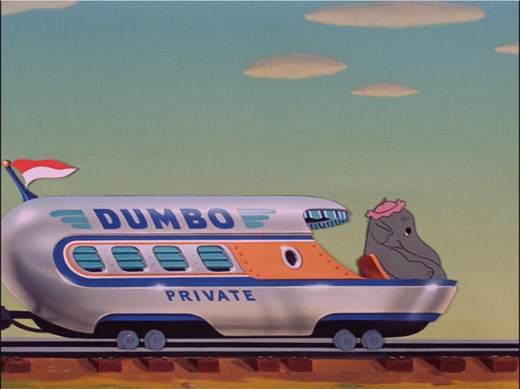
Dumbo is a film full of illogical scenes and developments. It's grandfathered into the cultural pantheon despite outdated imagery and storytelling. It has good intentions, utilizing themes of overcoming adversity, the endurance of familial love, and appreciating each other's differences. But these good intentions are drowned in too many narrative shortcuts and a sloppy execution. It’s a pleasant movie the less you remember, and most people’s memories are hazy. What’s more appropriate from a film whose most famous scene is a surreal drunken musical hallucination?
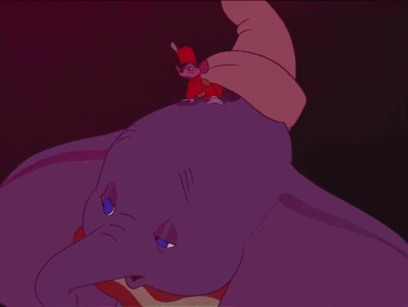
Fantasia Snow White and the Seven Dwarfs Pinocchio Dumbo
#Dumbo#Disney#walt disney#Walt Disney Animation Studios#Film Criticism#film analysis#review#Disney Canon
9 notes
·
View notes
Text
Words Never Die
by Gary Simpson
1 Samuel 3:1-20 (King James Version) And the child Samuel ministered unto the Lord before Eli. And the word of the Lord was precious in those days; there was no open vision. And it came to pass at that time, when Eli was laid down in his place, and his eyes began to wax dim, that he could not see; and ere the lamp of God went out in the temple of the Lord, where the ark of God was, and Samuel was laid down to sleep; that the Lord called Samuel: and he answered, Here am I. 5 And he ran unto Eli, and said, Here am I; for thou calledst me. And he said, I called not; lie down again. And he went and lay down. 6 And the Lord called yet again, Samuel. And Samuel arose and went to Eli, and said, Here am I; for thou didst call me. And he answered, I called not, my son; lie down again. 7 Now Samuel did not yet know the Lord, neither was the word of the Lord yet revealed unto him. 8 And the Lord called Samuel again the third time. And he arose and went to Eli, and said, Here am I; for thou didst call me. And Eli perceived that the Lord had called the child. 9 Therefore Eli said unto Samuel, Go, lie down: and it shall be, if he call thee, that thou shalt say, Speak, Lord; for thy servant heareth. So Samuel went and lay down in his place. 10 And the Lord came, and stood, and called as at other times, Samuel, Samuel. Then Samuel answered, Speak; for thy servant heareth.
11 And the Lord said to Samuel, Behold, I will do a thing in Israel, at which both the ears of every one that heareth it shall tingle. In that day I will perform against Eli all things which I have spoken concerning his house: when I begin, I will also make an end. For I have told him that I will judge his house for ever for the iniquity which he knoweth; because his sons made themselves vile, and he restrained them not. And therefore I have sworn unto the house of Eli, that the iniquity of Eli’s house shall not be purged with sacrifice nor offering for ever.
15 And Samuel lay until the morning, and opened the doors of the house of the Lord. And Samuel feared to shew Eli the vision. Then Eli called Samuel, and said, Samuel, my son. And he answered, Here am I. And he said, What is the thing that the Lord hath said unto thee? I pray thee hide it not from me: God do so to thee, and more also, if thou hide any thing from me of all the things that he said unto thee. And Samuel told him every whit, and hid nothing from him. And he said, It is the Lord: let him do what seemeth him good.
19 And Samuel grew, and the Lord was with him, and did let none of his words fall to the ground. 20 And all Israel from Dan even to Beer-sheba knew that Samuel was established to be a prophet of the Lord.
Reflection:
There is an old public domain hymn titled “Kind Words Never Die.” Sadly, angry words take on a life of their own too. In no realm does that seem more accurate than political and religious discussions.
Three general principles you might want to look for in this sermon. (1) Ridicule and insults can cause religious and political divisions and political tension. (2) We can reflect on how our theological beliefs and political news consumption may cause us to hate others. (3) Look for ways to build people up.
There are times when a dose of Biblical trivia feels right. And this is one of those times. In the Septuagint, 1st and 2nd Samuel were called 1st and 2nd Kingdoms, and 1st and 2nd Kings were called 3rd and 4th Kingdoms.(1) A few people think 1st and 2nd Samuel would be better named Saul and David, or 1st and 2nd David.(2)
First and Second Samuel were probably written about 900 BCE(3), and the events described in 1st Samuel might date back to somewhere between 1200 and 1000 BCE.(4) The book was written after the division of the nation into two kingdoms, the northern and the southern kingdoms.(5) The events in the book of 1st Samuel take place during a time of political change. The children of Israel were transitioning into a monarchical form of government.(6) We see a shift from the leadership of priests, prophets and judges to kings.(7)
As we look to contemporary issues dividing Canada and the United States, we may find parts of 1st Samuel, a book written for a people divided into two kingdoms, valuable. A major theme in 1st Samuel is that the main characters, Samuel, Saul, and David, all “make mistakes that cost them dearly.”(8) This last point, which seems quite trivial, could be important. Religious institutions and religious leaders, combined with political institutions and political leaders, made mistakes that could be challenging for North Americans for many years. Decisions relating to the creation and operation of residential schools made by the Canadian Government and church denominations hurt generations of Indigenous people. Contributors to the NIV Foundation Study Bible observe that Samuel’s ministry is built on a foundation of an “attitude of listening.”(9) And listening could be critical to the future for people of faith.
There is some literary foreshadowing in the passage. Samuel means “requested of God.”(10) We can get the sense that there is something special about Samuel, and that sense increases as we read the narratives in 1st and 2nd Samuel.
In the ancient Near Eastern world, prophets gave messages from God. Should a god not give messages through prophets, it was considered a sign that the gods were unhappy.(11) Contributors to the Cultural Backgrounds Study Bible indicate that some people speculate that Samuel was in the temple area at night in hopes of receiving a “divine vision,” but there is nothing in the Biblical passage that supports that conclusion.(12)
Verses 15 to 17 are worth exploring for a moment. Warren Wiersbe draws attention to the fact that Samuel got up and went about his daily duties. He gives Samuel credit for being mature enough not to run around telling everyone that God gave him a special message.(13) I am not sure if it was maturity or dread of telling Eli the message God gave Samuel. Because Eli was almost like a foster father, Samuel might have loved Eli. His love for Eli might have been why Samuel was reluctant to tell Eli God’s message. Samuel did not want to hurt Eli.(14) Eli had a long vocational calling as a judge, having judged Israel for 40 years. Knowing Eli's vocation might have made it even more difficult for Samuel to deliver God’s stern message.(15)
Eli appears to threaten Samuel. He says Samuel must tell the whole truth and not to hide anything from him or God will deal severely with Samuel. Eli may have spoken strongly because he realized that God did something “rare” when God bypassed him and gave Samuel a message.(16) Eli, who recognizes physical maturity does not always go hand-in-hand with spiritual maturity, takes the rebuke God gives him through the mouth of young Samuel.(17) I think Eli shows significant maturity in his willingness to seek out and to accept the message Samuel gave.
Moses understood the children of Israel wanted to have a king.(18) There could be many reasons why the children of Israel wanted a king, a person of power, leading their country. They might have been seeking power, prestige, and a feeling of safety. Chapters 8-12 of 1 Samuel describe the establishment of a king for the children of Israel.(19) Was a desire to have a powerful leader, a person who could protect people of faith, a factor in some Christians being involved in the Capitol protest, a protest that claimed the lives of people? Did some people of faith believe they needed a strong president, a virtual king figure to protect their faith? We may never know.
When protesters took over the Capitol Building in Washington, DC., a few Americans carried crosses and Christian banners. Photos show somebody put up a noose. There was a massive juxtaposition between the images. As Canadians we cannot look down our noses at our American neighbors and congratulate ourselves that this could never happen in Canada. Increasingly strong and polarizing rhetoric is not just an American thing. We have the same problem here. Polarizing language between conservative and progressive Christians is both a Canadian and an American problem.
There are a few things that we may want to consider when reviewing how you live out your religious and political convictions.
• Is our shared theology and understanding of the Bible helping us feel more compassion for others, or are we finding ourselves progressively feeling more angry with those who do not share our values or our doctrine?
• When we hear a politician or a minister speak, do we find ourselves feeling increasingly angry because we believe that we are being cheated?
• Have we studied, to understand, and not to prove other people wrong, the beliefs of other Christian denominations and other world religions?
• Do we find ourselves engaging in calling members of other religious or political groups names? Do we find ourselves calling either progressive or conservative Christians names?
• Do we decide to vote based only on one political issue?
• Are there times when we seriously want to punch people who disagree with us on core issues?
• Do we spend hours each week listening to all news, all talk shows? Are we feeling anxious and angry after we watch hours of news and opinion shows?
If some of the things I mentioned seem to describe you, this might be a sign that you need to focus less on news and theology. You may want to limit your consumption of news to the morning news and the evening news. That might help you feel less like your core values are being assaulted.
Anglican theologian John Stott states, “No theology is genuinely Christian which does not arise from and focus on the cross.”(20) Historically Christians have seen love and grace as being symbolized in the cross. This means Christian theology is only genuine Christian theology when it shows love and grace. A prime test of love is respect. When we express theology in a loving manner, we attempt to show respect for those who disagree. The use of sarcastic language, ridicule, and insults might win the argument, but it generally loses the war, since the tactics offend and alienate.
I am going to conclude with a story.
Lawrence Welk is a big band leader who had a highly successful career. There is a website that estimates the net worth of celebrities. According to the website, when Lawrence Welk died in 1992, he might have been the richest person in show business, possibly being even more wealthy than the legendary Bob Hope.(21)
I hope that I recall the story correctly because it has been years since I read Lawrence Welk’s autobiography. As I recall the story, Lawrence Welk was reminiscing about his early days in show business. Welk and his boss, the leader of the band he was in, were eating in a café. Evidently, the food was pretty awful. Lawrence Welk complained about the food. The leader of the band complimented the waitress on the coffee. Later, Lawrence Welk asked the leader of the band why he didn’t complain about the bad food. The bandleader replied to the effect that whenever the waitress heard his name, she would think about how he complimented her for the coffee and whenever the waitress heard Lawrence Welk's name, she would remember how he criticized the food.
I encourage people to change the topic from political concerns and religion to other topics and to look for a reason to praise. Your kind words will be remembered and will build a bridge.
Kind words can never die,
Cherished and blest,
God knows how deep they lie,
Stored in the breast:
Like childhood’s simple rhymes,
Said o’er a thousand times,
Aye, in all years and climes,
Distant and near.
Kind words can never die(22)
End Notes
(1) Joel Rosenberg. “1 and 2 Samuel.” The Literary Guide to the Bible. (Cambridge, Massachusetts: Harvard Univ. Press, 1987), 122.
(2) Rosenberg. (1987), 122.
(3) Marshall Shelley, et al., eds. The Quest Study Bible. (Grand Rapids, Michigan: Zandervan Pub., 1994), 358.
(4) John H. Walton and Craig S. Keener, eds. New King James Version Cultural Backgrounds Study Bible. (Grand Rapids, Michigan: Zandervan Pub., 2017), 480.
(5) Shelley, et al. (1994), 358.
(6) Walton and Keener, eds. (2017), 480.
(7) Rosenberg. (1987), 122.
(8) NIV Foundation Study Bible. (Grand Rapids, Michigan: Zandervan, 2015), 283.
(9) NIV Foundation Study Bible. (2015), 286.
(10) Merrill F. Unger. Unger's Bible Handbook: An Essential Guide to Understanding the Bible. (Chicago: Moody Press, 1967), 187.
(11) Walton and Keener. (2017), 486.
(12) Walton and Keener. (2017), 486.
(13) Warren W. Wiersbe. The Bible Exposition Commentary: History. Colorado Springs, Colorado: Victor, 2003), 216.
(14) Walter J. Harrelson, et al., eds. The New Interpreter's Study Bible. (Nashville, Tennessee: Abingdon Press, 2003), 399.
(15) Bruce Barton, et al., eds. Life Explanation Study Bible. 2nd ed. (Wheaton, Illinois: Tyndale House Pub., 2004), 413.
(16) Shelley, et al. (1994), 363.
(17) Christian Community Bible. 2nd ed. (Madrid, Spain: San Pablo, 1988), 277.
(18) Kenneth Barker, et al., eds. The NIV Study Bible. (Grand Rapids, Michigan: Zandervan Pub., 1985), 372.
(19) Barker, et al. (1985), 372.
(20) John Stott. The Cross of Christ. (Doners Grove, Illinois: InterVarsity Press, 1986), 216.
(21) “Lawrence Welk Net Worth.” Celebrity Net Worth. 2020, 16 January 2021.
<https://www.celebritynetworth.com/richest-celebrities/rock-stars/lawrence-welk-net-worth/>.
(22) Abbey Hutchinson Patton. “Kind Words Can Never Die.” Public Domain Hymns. <https://www.pdhymns.com/SheetMusic/B_Normal/I-Q_Normal/K_Normal/Kind%20Words%20Can%20Never%20Die_N.pdf>.
2 notes
·
View notes
Text
LB1 Thoughts and Review (spoiler warning!)
Boy, what a chapter! I already knew some spoilers from JP threads but going through it myself really makes a difference!
Gameplay
I was a bit worried that there might be a huge jump in difficulty like in Camelot, but it's been more or less fine so far. The only boss that was challenging was Nastya thanks to her Invul Pierce skill RNG screwing me over right when she was almost dead.
But hey, at least I managed to show off my Proto Cu! His Beast-hunter skill worked wonders on the battles, because almost everyone (even bosses like Atalante Alter and Ivan!) had the ‘Wild Beast’ trait. In the end, the Hydras weren’t that bad thanks to him.
Music
The music was still great as always! The map theme was really sad and forebodingl. The use of public domain classics like Twinkle Twinkle Little Star and Dies Irae was really emotional and hype respectively.
Characters
I loved the character interactions. From the old characters, Billy and Beowulf were my favorites. In America we spent more time with Robin instead of Billy and Beowulf was an enemy, so I didn't really get to see how they think and tic, but here with them taking a somewhat major role, I got a lot more attached to them. Beowulf isn't just a random Berserker, sure he likes fighting but when not fighting he's very chill, reasonable and responsible; even when fighting, he's not the reckless Kenpachi type but can make priorities and knows that NIGERUNDAYO living to fight for another day is important too. Billy is cheery and kind to his allies, but he's also very quick on the trigger and can be quite ruthless should the situation call for it. And he himself is quite aware of it.
From the new characters, all I have to say is that Salieri is best boy. I love my Angry Piano Man. And while he's not new to the franchise, the recently-added Avicebron goes up and above his Avicebro nickname. He knows he messed up in his previous HGW, and now works to fix his problems, ranging from him interacting more than necessary despite disliking humans, to sacrificing his own life to give us a fighting chance and atone for using Roche as Adam's core.
On the NPC side, Patxi is the best. I already knew how things would end but it wasn't any less painful. If anything, me knowing what was to come only made things worse, especially whenever he showed interest and fascination for our world.
Now, as for the villains, other than Beryl and Caenis, I liked everyone! Kotomine is bound to be entertaining. Knowing that she'll get her comeuppance in the next LBs, Koyanskaya's BS was a little more tolerable. And Ivan was just sad; he tried his hardest, had good intentions behind his actions but in the end it wasn't enough. And he still accepted his defeat gracefully!
While he's far from being my favorite Crypter (don't dislike him, I just like Ophelia, Akuta and Wodime more), I did like Kadoc and his relationship with Nastya. His character was pretty straightforward, and while he does need to get over himself at some point, being an underdog whose only place got taken by another "less skilled" underdog must've been a painful blow to someone suffering from inferiority complex.
Misc
The plot had a bit of the usual ‘fight/fetch quest’ pacing awkwardness.
LB6 is so far!! I need answers about Galahad!
Kadoc and Nastya’s final stand against MC was just another version of MC and Mash’s final stand against Goetia.
17 notes
·
View notes